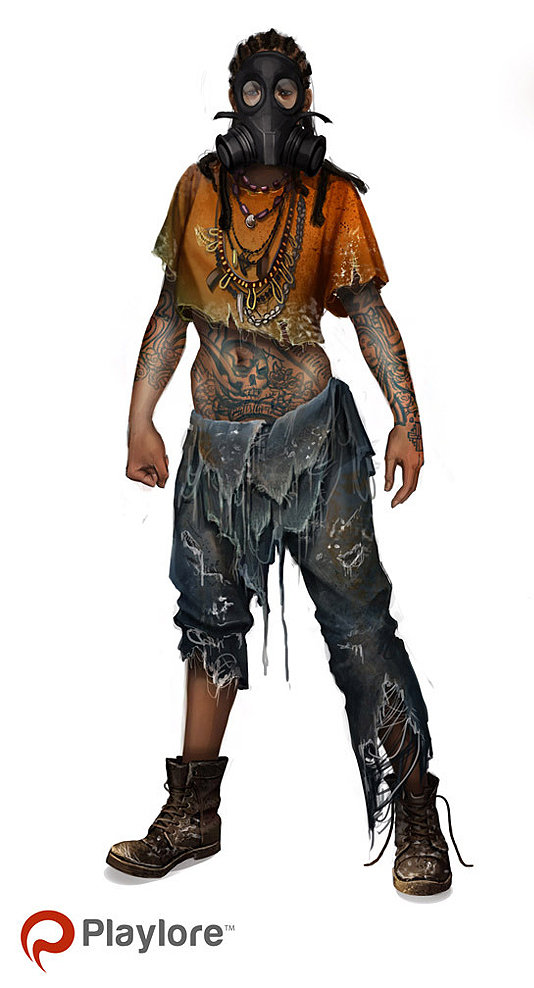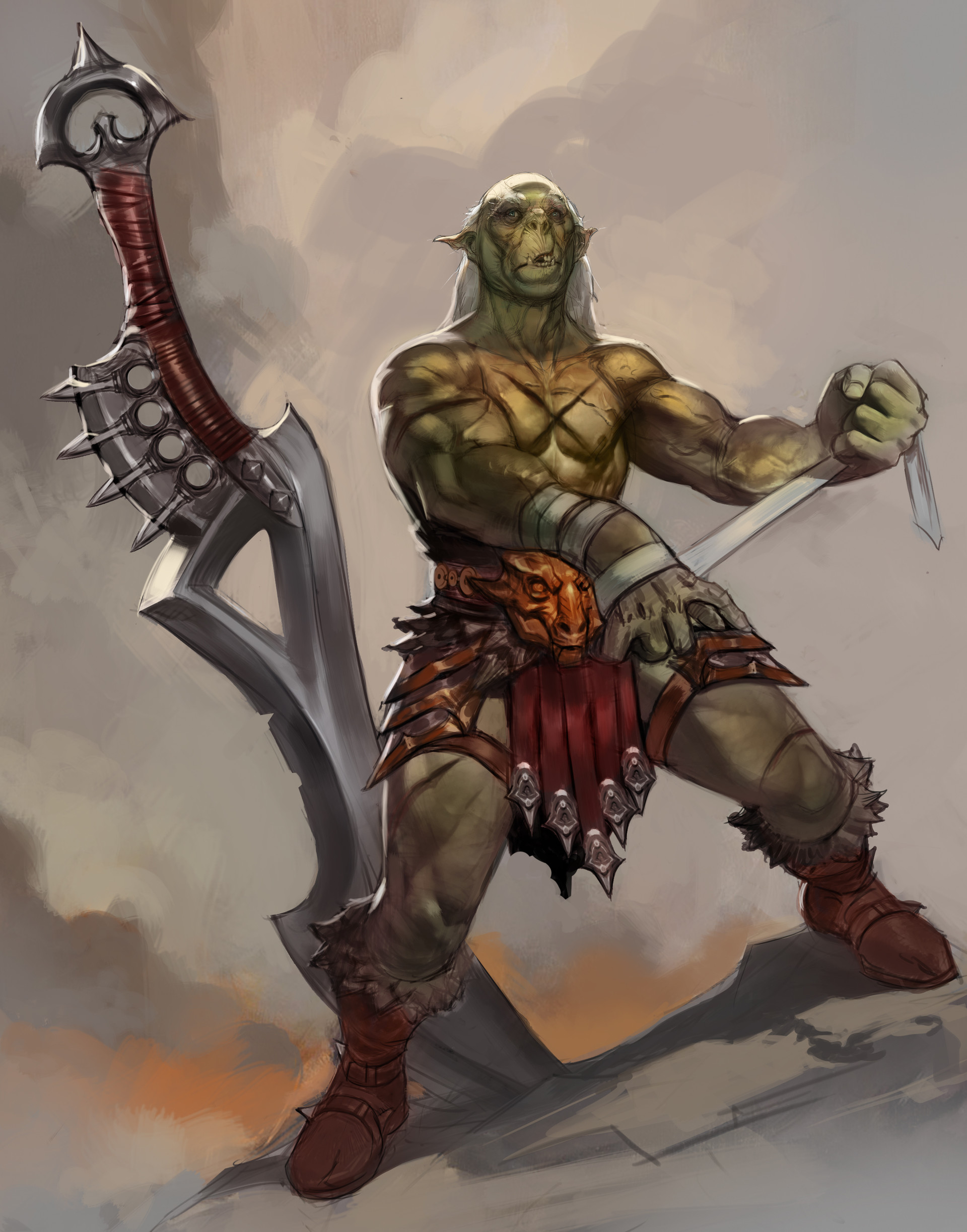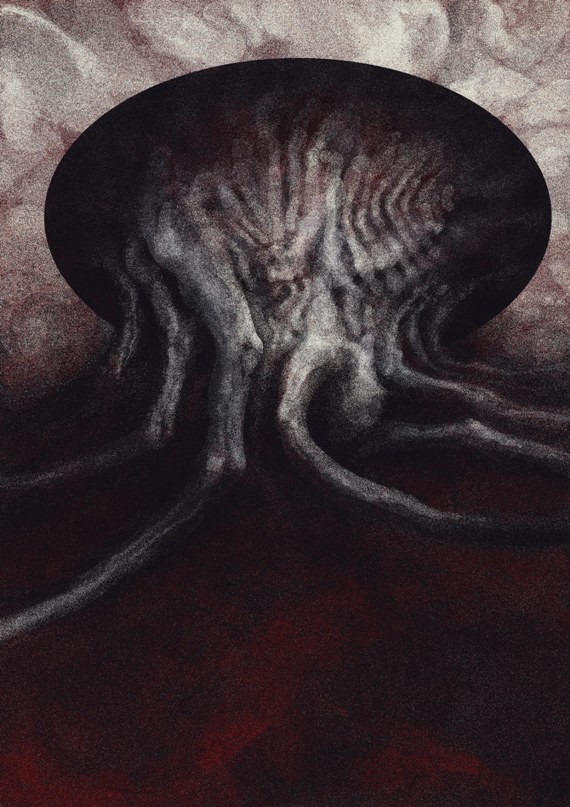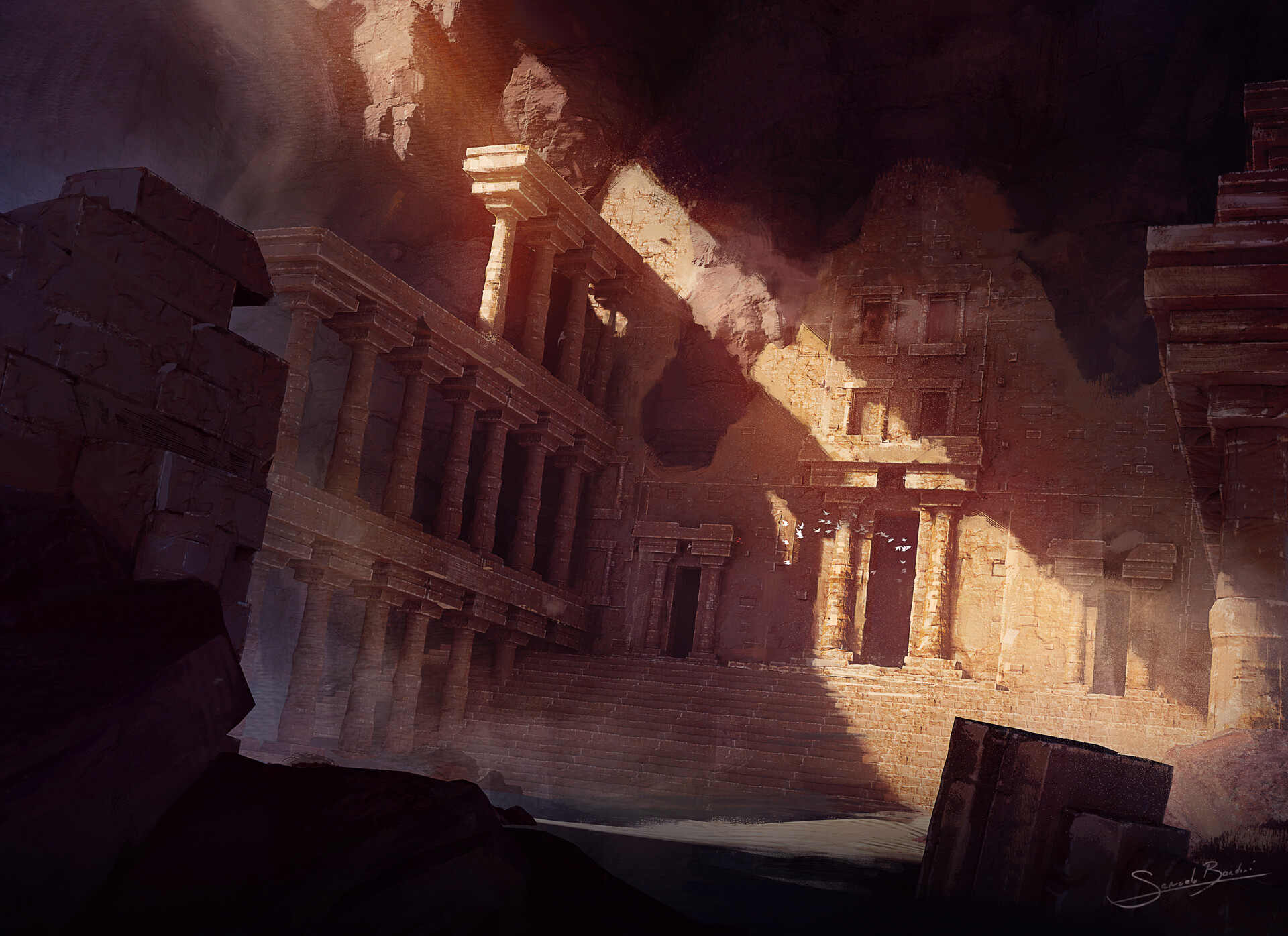You do not “get angry”. You will never “get angry”. The rage that occasionally bursts capillaries all over your body, bruises muscles, and leaves your vocal cords a sweltering, bloody mess is something older than anger. Like it, hate it, it lives within you. Most of the time, it leaves you alone. Every so often you erupt, and when you do, people and objects break.
You’ve found a way to call it or calm it. It’s a companion now, with no setting between asleep and ravening.
If you get hurt, it doesn’t matter how you feel. The dog’s been in his house some time now, and he wants to be LET OUT.
 |
| Song zhenyang |
GLOG Class: Berzerker
A: +1 Rage Dice, Conduit, Notches, Rumble
B: +1 RD, Froth, Malaise
C: +1 RD, Mindless, Die Hard
D: +1 RD, Relentless
Thanks to the murderous Lexi for her gory editing!
Rage Dice are what power your murderous frenzies. They are d4’s. When you wish to rage you may roll Xd4 to enter a rage, which lasts for [sum] rounds. When you take damage and are not raging, you enter a rage with your remaining RD unless you Save versus Int with a penalty equal to your remaining RD.
Your rage grants you [dice] extra attacks per round and [sum] extra HP for the duration of the rage. You can try to end your rage early with a 1 in 4 chance. Any extra hit points over your HP maximum disappear when your rage ends. You take [dice] penalty to AC or your equivalent while raging.
While you rage, you can only take actions towards murdering things, and if your rage doesn’t expire, it lasts until all enemies are killed, subdued, or driven off. Spellcasting is possible but only for spells that deal damage, remove obstacles between you and enemies, or move you closer to enemies.
RD burn out on 3-4, doubles, triples, and quadruples, and return after a good night’s sleep.
Your Conduit is that which channels your rage. It can be a mantra, a tone, a torn portrait, a bell. Whatever it is, expressing and leashing (to an extent) your rage with this thing grants you a passive ability and an active ability to use while raging. When you use this active ability during your rage, it decreases the duration of your rage by [dice] rounds.
If your Conduit is broken or lost, you lose its active and passive benefits, Froth, and Malaise. You may acquire a new Conduit, but for each day you go without one, you get a -1 penalty to Int Saves not to enter rage upon taking damage or in stressful situations.
You gain Notches when you kill things 10, 20, 35, and 55 times with the same weapon.
10 times: +1 damage with that weapon
20 times: Expanded crit range (however you adjudicate that)
35 times: Passive weapon ability #1
55 times: Passive weapon ability #2
You may seek out fighters of especial puissance to Rumble with them, fighting one-on-one. For every opponent you defeat unaided with a number of class templates greater than or equal to yours, you gain +1 to damage against enemies with one armor type that was used in the Rumble.
Starting when you gain your 3rd Berzerker template, warriors with a number of templates equal to yours will seek you out as you travel to test their strength. If you beat challengers unaided, you gain +1 Defense against one weapon that was used.
Froths are special effects triggered by doubles and triples on your Rage Dice. When you enter a rage and roll doubles or triples, consult the relevant table, roll, and apply its effects for the duration of the rage. Each Froth triggers a Malaise, each action an opposing reaction. Froth and Malaise effects will not trigger if you're wearing armor.
If you roll quadruples (1% chance with 4d4), roll twice on the triples chart and apply both effects.
When you trigger Froth, you also trigger Malaise. After rolling Froth, check the appropriate Malaise table and suffer the effect which corresponds with the Froth.
Your rage is Mindless. You’re immune to magical effects that would affect your mind while raging, and if you’re affected by a spell against your will, the spell ends as soon as you enter rage.
You’ll Die Hard. You have 4 turns to heal Fatal Wounds instead of 3.
You are Relentless. When you’re raging and you kill a creature, roll a d4. Your rage extends for that many rounds. Additionally, if you drop to 0 HP while raging, you are able to keep raging and ignore the effects of Fatal Wounds as long as your rage lasts like the Black Knight from Monty Python. (You can still be killed from disintegration or beheading. Be reasonable.)
Keep track of your Fatal Wounds, though, because if you haven’t healed them before 4 rounds have passed, you’ll suffer their effects immediately after ending your rage, potentially dying on the spot.
Conduit: A Mirror Darkly
Somewhere, sometime, you collected a small hand mirror of unknown provenance. The handle and frame are stained silver, the mirror a bright slab of inky stone. There’s a gemstone setting without a stone on the handle’s end.
When you look in the mirror, you see yourself as you wish to be. Sometimes you see an older you with a gentle smile, surrounded by vague black silhouettes at a smoky table in a blurry room. Sometimes you see your torn, rough hands cradling a child.
Sometimes, you see a face torsioned by roiling muscle into a gaping rictus drenched in blood.
Passive benefit: The mirror provides you with flashes of what might be, augmenting your senses. You have a 2 in 4 chance to detect ambushes and similar surprises right before they happen.
Active benefit: For a round, your exposed skin becomes empty and reflective. Any hostile creatures who can see you must Save (creatures fighting you in melee automatically fail) or see visions of their most likely death, believe it to be possible, and react accordingly.
Doubles: (1d4)
Froth: When enemies damage you in a way that could break glass, everyone very close to you takes [dice] damage from small, shiny stone shards.
Malaise: Your flesh takes on the qualities of glass for [dice] hours.
Froth: You reflect light sources stronger than a torch painfully, forcing those looking at you to Save or be blinded for [dice] rounds as their eyes adjust.
Malaise: Every bit of your body reflects light powerfully for [dice] hours.
Froth: You can attack the reflections of enemies.
Malaise: You can only see the world reflected for [sum] hours.
Froth: You only become visible in reflected surfaces.
Malaise: You become a reflection for [dice] hours. You can still interact with creatures’ reflections and retain all your belongings, but upon your return to the real world you arrive naked unless you exit the mirrorworld where your belongings are.
Triples: (1d4)
Froth: Your reflection splits off from you and can attack and be attacked by enemies reflections as if it were you. It is unaffected by things that have no reflection.
Malaise: Your reflection stays enraged and murderous for [dice] hours. It’ll seek things to kill.
Froth: You split into [dice] copies, each possessing [current HP]/[dice] and your equipment. Each one can make 1 attack. You control each one, and if they all die before your rage ends, you die.
Malaise: Any enemy you critically hit for the duration of your rage splits into [dice] copies of itself with HP equal to [current HP]/[dice]. These copies last until killed.
When you kill an enemy, they explode in showers of polished stone for [dice] damage to nearby enemies. If another enemy is killed by this damage, they also explode with the same effect.
Malaise: This above Froth applies to you and all allied creatures for [dice] hours. If you gather all the shards of a shattered creature up and put them back together, a stone to flesh spell might do something...
Froth: Roll twice on the Doubles Froth table and apply both Froth effects.
Malaise: Apply both Malaise effects for the Froth effects you rolled.
 |
| Alice Bessoni |
Conduit: Drug Fiend
You have 2d10 doses of a substance that keeps you on the straight and narrow and 1d4 doses of two more recreational ones. You’ve experimented a lot to find something that works for you, so you have a pretty good idea of what most drugs do to people. Need a hookup? No problem, s’long as you got the dough.
Don’t get between these people and their dope. Shred is a kind work for the violence they will visit on your meat.
Passive benefit: You can tell what a drug might do (benefits/dependence) by handling/sampling a bit of it. You can also hook people up with some good stuff cause you know the right people, and you can tell what drugs someone’s on with a glance. Become a drug connoisseur! Sample poisons! Experiment!
Active benefit: You can consume a dose of your drug to instantly end your rage.
What is this drug, specifically? Well, a stereotypical one is:
Elagoria paste (pastepal, happytoff, chill bill)
Description: A thick, chunky, chewy brown paste with blue highlights. Is applied by smearing it on a mucus membrane.
Effects: Calms emotions and relieves the symptoms of emotional problems (anger management, anxiety, depression, etc.)
Application: Comes in a sealed jar with 2d4+1 doses. Each dose lasts a day.
Dependency: Stains the membrane in question a vibrant yellow and makes the breath sweet.
Overdose: Coma for 1d4 days. Save again at the end of the coma, if you pass you wake up and if you fail you quietly die.
Obtaining it: Banana rose fruit mashed up with the dried brain of insane people and fermented with yeast.
For more drugs: Goblin Punch, Scrap Princess, Wyrdspeak.
Doubles: (1d4)
Froth: Exhale the drug or poison you’ve most recently taken. People close to you must Save or be affected by the drug or poison for [sum] rounds.
Malaise: You continue to breathe out drug stuff for [dice] hours.
2. Froth: When you damage an enemy, they must Save or suffer a random drug’s overdose effect for [dice] rounds.
Malaise: For [dice] hours, any person you touch has to Save or suffer the overdose effects for [sum] minutes.
3. Froth: You gain the effects of [dice] drugs you’ve ingested of your choice.
Malaise: You suffer the dependency effects of those drugs for [dice] hours.
4. Froth: You become immune to a harmful liquid/powder/paste inside of you/that you ingest.
Malaise: You suffer it’s effects for [dice] rounds, but make your Save with a [dice] bonus, and if you pass all of them, the effects of the substance end.
Triples:
Froth: When you take damage, [dice] small homunculi crawls out of the wound. They have [dice] HP, and when they die or touch someone, they explode for [dice] damage (you’re unaffected) and cause all creatures within 10 feet to Save or be affected by a drug of your choice. You direct them.
Malaise: Homunculi crawl out of your mouth for [dice] hours, and you don’t control them. If they’re prevented from escaping, they explode inside you for [dice] damage.
2. Froth: You’re immune to a method of exposure to drugs of your choice. (Piercing, slashing, snorting, ear dropper, etc.)
Malaise: You’re vulnerable to that method of exposure for [dice] hours. If it’s a type of damage that can be inflicted by weapons, you either take 2x the damage total or gain a Fatal Wound, your choice. If it’s inhalation, you automatically fail your saves against gaseous things. Etc.
3. Froth: Your blood is horrifically corrosive. Anyone within 10 feet of you when you take damage takes [sum] acid damage. Save for half. Metallic or organic objects are degraded by this stuff.
Malaise: This substance turns into a gas that has the same effect with radius equal to 10 * [dice] when your Rage ends. Run!
4. Froth: Roll twice on the Doubles table and gain both effects.
Malaise: Suffer both the Doubles effects at the same time.
Notes on Rumble:
Rumbles are supposed to be pit fights, more or less. There’s at least one fighter in every town who’ll Rumble with you, and you have a 50% chance of encountering a traveling fighter on a journey..
Rumbles will occur at a time and place agreed upon by all contestants before hand. Observers are welcome and usually encouraged, as is betting. Interfering in a fight except to stop the rumblers from killing each other results in an automatic loss for the fighter supported by the interference. Rumbles end when one side/fighter is at 0 HP. Some rumbles are to the death, but those are grudge matches or gladiatorial combats.
At the end of the Rumble, if you win, roll 1d6, add half your remaining HP, and consult the Thumping chart.
1. It was very, very close. If there was any suspicion of cheating, you’ve earned a Hateful Rival. Otherwise, you earn a friend.
2. Well fought, but you won. Gain a Friendly Rival.
3. You put up a decidedly better showing then they did. If you treat them well, you’ve earned a Friendly Rival.
4. A combination of cunning and toughness puts you on top. If you disparage them, you’ve earned a Hateful Rival. If you treat them well, a Friendly Rival.
5. It was a beatdown. If you’re kind, they may ask to become your Companion, otherwise you’ve gained a Hateful Rival.
6+. You trounced them. Hard. If you were mean, they’re a Hateful Rival. Otherwise, they’ll ask to become your Companion and treat you with respect.
Rivals:
Rivals are fighters you know casually and have an ongoing competitive relationship with. They may become friends, important NPC’s, PC’s, romantic relationships, or deadly enemies. If you beat them by 4 or more on the Thumping chart, they’ll gain 1d2 class templates before seeking you out to try again. Rivals will try to best you 1d6+1 times before giving up.
If a Rival ever beats you, you lose 1 point of Charisma as your reputation for being a tough gal lessens. You regain that point if you beat them again.
For every two Rivals that give up, you gain a point of Charisma.
Hateful Rivals - Every time you beat a Hateful Rival, they have a cumulative 10% chance of trying to kill you the next time you fight or when given a chance. There’s a 25% chance they’ll act like a Friendly Rival while hating your guts.
Friendly Rivals - these people are drinking buddies. You may run into them at other times and share a flask of rotgut while reminiscing over past adventures. If you beat them every time they challenge, they’ll either ask to become a Companion or become a genuine friend.
Companions:
Companions are henchmen with an important difference: they’re here to learn. They’ll fight for you and protect you and expect half the normal treasure share for a henchman. In return, they expect you to train them. The XP requirement for an NPC Companion to level/gain a template is reduced by 20% as long as you spend actual time training them. You cannot teach them anything you don’t know.
If the Companion ever gains as many total templates as you have, they’ll leave to forge their own future. If you’ve treated them well and fairly, then you can call upon them for future assistance should you need it.
If you treated them badly and/or if you didn’t teach them but promised to, you’ve earned an enemy.
Design Notes on Rumble:
I’m going to try give all my martial classes this in one format or another. Veterans and Gunslingers will have Scores (though Gunslinger Scores will be more like Rumbles), Berzerkers have Rumbles, Soldiers (my fighter replacement) will have Rumbles, Nobles will have Rivals, and Assassins will have Competitors.
Wizards will have Grudges. Bards will have Rivals. Clerics should have Nemeses - like a fellow worshiper who believes almost everything else you do except one thing that you cannot abide. My personal opinion is that Sorcerers are too full of themselves to give a shit about anything else. I’m excited over taking a crack at writing rules for a GLOG wizard duel and a GLOG bard duel.
Warlocks may have Pursuers? Most warlocks exist outside typical power structures and deal with creatures nasty enough to trigger some backlash from society anyway, but I do like the idea of a recurring hunter.
I’m not sure about Druids.
You’re welcome to discard the additional material from the class (or all of them) if you like; I’ve tried to make Rumble work without these features.
I think having a network of friends, apprentices, and rivalries would deepen immersion for PC’s and give them a tangible sense of grounding the more templates they gain. Plus, it gives them goals and ways to help each other out. Nobility, religious figures, and magic users are famous for petty grudges and rivalries - why shouldn’t martial classes gain the same benefit?
General Design Notes:
Well, most of my classes are definitely going to have some sort of dice mechanics with benefits and drawbacks and subclasses. Judging from the massive popularity of wizards, this formula needs to be more widely applied to even out the mechanical weight of the GLOG.
I think the word berzerker occupies a different and more neutral conceptual space than barbarian. Barbarian, as a word, carries its own cultural baggage and lends itself to a narrower design space. It’s true that berzerkers probably didn’t carry around magic mirrors, but whatever. My point is that any design that can have its majority flavor injected into it instead of inferred while still retaining enough base elements (or tropes) to be distinct offers a more branching and fuller space to game inside.
Besides, I don’t think there’s any one way to play an archetype (to clarify, raging person is the archetype here) and I want to reflect that in my design. I also think designing modular classes allow for much greater engagement and collaboration. Making a GLOG wizard was kind of a rite of passage for me.
It’s true that some classes I’m going to design will overlap heavily in design space (as in: different varieties of fighters) with other classes. I think that’s fine because I want to establish a thematic feel to my world. If template design is how a class (and by extension, a player) will approach the problems they come across, then class design is how a player will deduce what problems exist to be solved. If all your classes are combative and involve weapons, then you’ve created a world of fighting people where problems are solved with violence. Skerple’s monks (think Catholic monks), goliards, and underground cannibal gourmets are excellent examples of class design that not only incentivizes the creation of situations in which their abilities will be useful but also opens up entirely new toolsets to solve problems and creates a mental world in which underground cannibal gourmets are a valid way of solving problems. Cook and eat your problems!
To aid this mindset, I think I’m going to create a GLOG Artist class and use that GLOG Philosopher Skerples made. A party with a potter, a philosopher, a gunslinger, and a pink fluff warlock is a damn good party.





